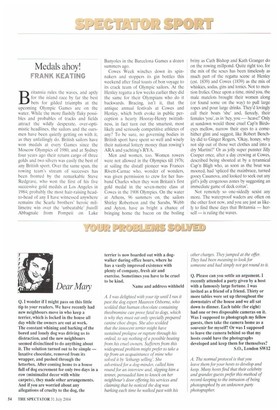Medals ahoy!
FRANK KEATING
Britannia rules the waves, and aptly for the island race by far the best bets for gilded triumphs at the upcoming Olympic Games are on the water. While the more flashily flaky possibles and probables of tracks and fields attract the wildly desperate, over-optimistic headlines, the sailors and the oarsmen have been quietly getting on with it, as they unfailingly do. British sailors have won medals at every Games since the Moscow Olympics of 1980, and at Sydney four years ago their return cargo of three golds and two silvers was easily the best of any British sport. Over the same span, the rowing team's stream of successes has been fronted by the remarkable Steve Redgrave, who won the first of his five successive gold medals at Los Angeles in 1984; probably the most hair-raising headto-head of any I have witnessed anywhere remains the Searle brothers' heroic millimetre win over the 'unbeatable' fi-atelli Abbagnale from Pompeii on Lake
Banyoles in the Barcelona Games a dozen summers ago.
Cowes Week winches down its spinnakers and stoppers its gin bottles this weekend after final toasts of bon voyage to its crack team of Olympic sailors. At the Henley regatta a few weeks earlier they did the same for their Olympians who do it backwards. Bracing, isn't it, that the antique annual festivals at Cowes and Henley, which both evoke in public perception a hearty Hooray-Henry twittishness, in fact turn out the smartest, most likely and seriously competitive athletes of any? To be sure, no governing bodies in British sport have spent so well and wisely their national lottery money than rowing's ARA and yachting's RYA.
Men and women, too. Women rowers were not allowed in the Olympics till 1976; at sailing the distaff pioneer was Frances Rivett-Carnac who, wonder of wonders, was given permission to crew for her husband Charles when they won Britain's first gold medal in the seven-metre class at Cowes in the 1908 Olympics. On the water at Athens, 96 summers on, the sailors Shirley Robertson and the Sarahs, Webb and Ayton, have as bright a chance of bringing home the bacon on the boiling briny as Cath Bishop and Kath Granger do on the rowing millpond. Quite right too, for the mix of the sexes has been timelessly as much part of the regatta scene at Henley (est. 1839) and Cowes (1839) as the mix of whiskies, sodas, gins and tonics. Not to mention frolics. Once upon a time, mind you, the male matelots brought their women along (or found some on the way) to pull large ropes and pour large drinks. They'd lovingly call their boats 'she' and, fiercely, their females 'you', as in `hey, you — heave!' Only at sundown would those cruel Cap'n Birdseyes mellow, narrow their eyes to a comehither glint and suggest, like Robert Benchley did to Ginger Rogers, 'Okay, honey, why not slip out of those wet clothes and into a dry Martini?' Or as jolly super punster Jilly Cooper once, after a day crewing at Cowes, described being shouted at by a tyrannical Cap'n Bligh who, as soon as the boat was moored, had 'spliced the mairibrace, turned gooey Casanova, and looked to seek out any girl's jolly erogenous zones by suggesting an immediate game of deck coitus'.
Not remotely so one-sidedly sexist any more. The waterproof waders are often on the other foot now, and you are just as likely to find these days that Britannia — herself— is ruling the waves.


























































 Previous page
Previous page